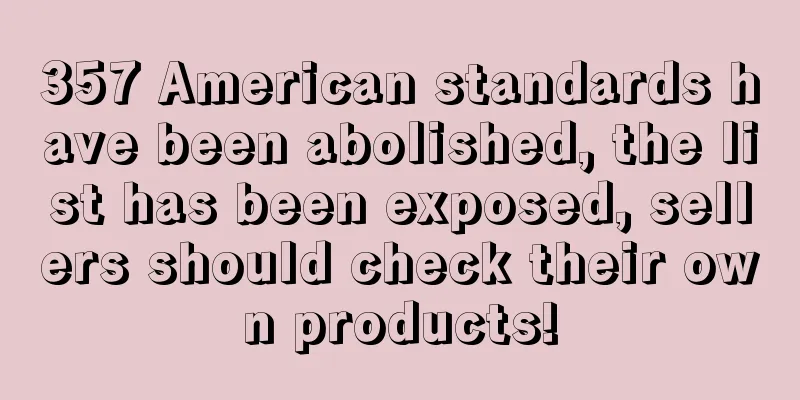357 American standards have been abolished, the list has been exposed, sellers should check their own products!

|
As sellers’ brand awareness gradually increases, the number of trademark registrations is increasing day by day. Especially Amazon sellers who are afraid of various infringement complaints understand the principle that intellectual property rights should come first before the market moves. As the saying goes, professional matters should be left to professionals. In the cross-border e-commerce industry, where various service providers have abundant resources, sellers' trademark applications are mostly handed over to specialized intellectual property companies for registration. However, the bankruptcy of an intellectual property company in Shenzhen in December last year told us that there are some risks for sellers to do so. If these companies apply through non-compliant means, the trademark will be invalidated, which will bring endless troubles to sellers who have already complained about the use of the trademark.
Only eight months have passed since the last trademark scandal , and news has come out that a large number of American trademarks have been abolished.
USPTO strikes again, hundreds of US patents are invalidated
After the above-mentioned Shenzhen intellectual property company went bankrupt, some professionals pointed out that this case and the sanction decision may become a precedent for the US Patent and Trademark Office to handle similar cases, and it is very likely that similar cases will be sentenced in the same way in the future. As the saying goes, only 8 months later, the same judgment came.
On August 8, local time, the United States Patent and Trademark Office (USPTO) published a decision on its official website, imposing final sanctions on Yanhua Chen and Huang Yuchen.
The decision letter pointed out that in the "show cause" order on June 30, the USPTO required Yanhua Chen and Huang Yuchen to respond by July 13 for violating the USPTO's Rules of Practice and Agent Rules for Trademark Cases, but no response has been received so far.
Based on the two persons’ violations, the USPTO imposed the following sanctions: (1) Permanently prohibit the respondent from submitting trademark-related documents on behalf of itself or others; (2) Deleting or ignoring all trademark-related documents submitted by the respondent; (3) The U.S. Patent and Trademark Office shall delete all correspondence related to the respondent from its database of all applications and/or registrations; (4) direct the Office of the Chief Information Officer of the United States Patent and Trademark Office to permanently disable any USPTO account containing contact information related to the Respondent and to take all reasonable steps to prevent the Respondent from creating or activating additional accounts; (5) terminate all ongoing proceedings, including proceedings involving documents filed by the Respondent, and the Trademark Status and Document Retrieval System (TSDR) shall be promptly updated to reflect this order; (6) The USPTO will continue to delete documents, remove information, and suspend and terminate proceedings that are later discovered to have been filed by a Respondent.
In a previously issued “show cause” order, the USPTO stated that they had reason to believe that Yanhua Chen and Huang Yuchen improperly submitted applications, responses, and other documents that falsely designated certain U.S.-licensed attorneys as representatives on more than 350 trademark applications.
The attorneys, Arianna Christopher, Robert Feinland, James Rosini or Laura, did not represent the clients, according to their testimony. Therefore, Yanhua Chen and Huang Yuchen signed their names on more than 350 trademark applications without the knowledge of the attorneys.
Yien.com observed that among the seven email addresses to which the U.S. Patent and Trademark Office sent inquiry emails to Yanhua Chen and Huang Yuchen, two were QQ email addresses, and the names of the two were obviously Chinese. In view of the previous bankruptcy of a Shenzhen intellectual property company, the trademarks that were abolished this time are most likely those represented by domestic intellectual property companies. Sellers need to conduct self-inspections according to the list as soon as possible .
Brand represents the competitiveness of an enterprise, and trademark is the carrier of the brand. Today, as brands become more and more important, not only are relevant departments increasingly strict in reviewing trademark registration applications, but platforms are also constantly increasing their protection of brands (trademarks). In this process, many Chinese sellers are often sued.
Amazon and international brands jointly sue Chinese sellers for trademark infringement
Recently, Amazon, together with the world-renowned luxury brand Cartier , filed a trademark infringement lawsuit against eight Chinese entities and a social media influencer from Handan, China, accusing them of selling fake jewelry online.
Amazon and Cartier allege that these Chinese entities and a social media influencer from Handan, China, used social media and multiple Amazon stores to sell cheap, counterfeit Cartier jewelry.
The complaint, filed in federal court in Washington, states that the alleged counterfeiter used the social media handle "Phym9y3v" and sold a number of trademarked items, including Cartier's popular gold "LOVE" bracelet.
Amazon and Cartier claim that the alleged counterfeiters used Instagram and Linktree and other sites to advertise the sale of authentic Cartier items, then linked consumers to an Amazon storefront where it stated the items for sale were “unbranded” in order to evade Amazon’s counterfeit detection tools.
“Defendants engaged in a sophisticated campaign to market, advertise, and sell counterfeit Cartier products in Amazon stores while disguising those products as non-branded items in order to evade Amazon’s counterfeit detection tools,” Amazon and Cartier said in the lawsuit.
However, the complaint alleges that the jewelry purchased by consumers was counterfeit but contained Cartier trademarks, as originally advertised by the social media accounts.
Amazon and Cartier claim that the alleged Chinese counterfeiters are guilty of false advertising and trademark infringement in violation of the Washington Consumer Protection Act.
The plaintiffs seek injunctive relief and general, special and actual damages.
In fact, in recent years, Amazon has been stepping up its efforts to address the problem of counterfeit goods on its platform. The second "Brand Protection Report" released by Amazon not long ago shows that Amazon invested more than US$900 million worldwide in 2021 and deployed more than 12,000 employees including machine scientists, software developers and expert investigators to hold bad actors accountable and protect consumers, brands and third-party sellers from counterfeit goods.
In 2021, Amazon filed civil lawsuits against more than 170 counterfeiters in U.S. courts, and prosecuted or transferred more than 600 criminals for investigation in the United States, the United Kingdom, the European Union, and China, an increase of more than 300% from 2020.
It is reported that Amazon has cooperated with brands such as Yeti, GoPro, Hanesbrands, Valentino, Weber, Salvatore Ferragamo, Whirlpool and Procter & Gamble to track down counterfeiters worldwide. Amazon has identified, seized and properly disposed of more than 3 million counterfeit products to prevent them from harming consumers or being resold elsewhere in the retail supply chain. This includes counterfeits that are attempted to be sent to the Amazon fulfillment network, and Amazon's cooperation with brands and law enforcement agencies to find warehouses and facilities for counterfeits and shut them down.
In summary, as brands are increasingly valued and protected, the behavior of cross-border e-commerce sellers who actively register trademarks is worthy of recognition. However, it should be noted that when looking for an intellectual property agency, it is necessary to strictly review its relevant qualifications. Otherwise, once a similar trademark is abolished, the seller will face endless troubles. Not only will it take time to reapply for the trademark, but the products on sale will also lose brand protection. What's more, during the reapplication period, the trademark may be registered by others, and even used by some lawless elements to complain about the seller's trademark infringement and blackmail. Trademark Infringement USPTO |
>>: Shipment attention! Congestion in many European and American ports is increasing
Recommend
Lazada 9.9 promotion concluded successfully, and many cross-border brands made it to the best-selling list!
9.9 promotion never stops, and there is no limit ...
What is RisingMobi? RisingMobi Review, Features
<span data-docs-delta="[[20,{"gallery"...
What is Shengfan Intellectual Property? Shengfan Intellectual Property Review, Features
Shengfan Intellectual Property was established bas...
The number of blank air tickets has increased significantly, and the exchange rate of transatlantic routes is about to soar
The Baltic Freight Index (FBX) on Friday showed a...
Shipping review in 2021: Ever Given stranded, California congestion, and soaring freight rates
This year has been a busy year for shipping , wit...
Where are the overseas opportunities this year? AliExpress: Continue to invest in the European and American markets, and increase investment in new markets in Japan, South Korea and the Middle East
Where are the overseas opportunities for cross-bo...
Extreme heat causes large numbers of fir trees to die, Christmas tree prices may soar
Christmas is the most important holiday for Chris...
Domestic products are popular overseas! Foreigners also love Chinese culture
In recent years, various traditional Chinese cult...
Visits increased by 11,000%! Temu continues to surge in Brazil
It is understood that Temu has currently expanded...
Wayfair's fourth-quarter net loss was $202 million as international revenue declined
Recently, according to foreign media reports, the...
What is the Central Bank of Swaziland? Central Bank of Swaziland Review, Features
The Central Bank of Swaziland has a stable price ...
What is Buy with Microsoft? Buy with Microsoft Review, Features
Buy with Microsoft is expected to be officially l...
Joint exhibition and forum investment promotion | Joint booth at transport logistic China and "2024 International Supply Chain and Cross-border New Ecosystem Forum": Everything is connected, driving global business opportunities
In the era of the Internet of Everything, how to ...
What is Sistrix? Sistrix Review, Features
Sistrix, which is well-known in German-speaking co...
What is SKULabs? SKULabs Review, Features
<span data-docs-delta="[[20,{"gallery"...









